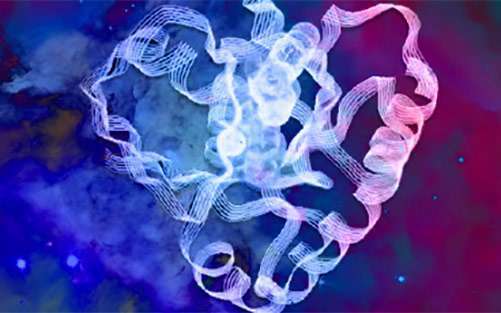
KRAS protein structure, reproduced with permission from NCI, FNLCR
Two new research studies offer encouraging steps toward developing effective therapies to target the notoriously challenging RAS mutations. About 95 percent of pancreatic cancer patients have a mutation in a RAS protein family member, KRAS, and it’s thought to be a driving force behind the disease. Yet, some researchers have deemed RAS “undruggable,” since previous efforts have been unsuccessful in finding ways to directly target and inhibit RAS activity.

KRAS protein structure, reproduced with permission from NCI, FNLCR
In one study out today in Nature Communications, researchers found that a new monoclonal antibody, called RT11-i, was able to get inside of cells expressing mutant RAS and directly bind to and target activated RAS to inhibit tumor growth in mouse models.
A second study published in the PNAS journal this week indicates that a newly-developed artificial version of a molecule called a microRNA could effectively target the cancer-driving mutated KRAS proteins in mouse models without harming normal KRAS proteins. This approach would help prevent major side effects.
Both studies are in the preclinical stages, so more research will need to be conducted to translate these findings into novel treatments to be studied in patients through clinical trials. Yet, the advancements are noteworthy in overcoming perceived barriers in fighting the challenging KRAS mutations.
Beyond pancreatic cancer, more than 30 percent of all human cancer cases have a RAS mutation, so targeting these cancer drivers would have enormous implications in helping to bring successful treatments to patients with many types of cancer as well.
Watch now! Experts in Pancreatic Cancer and KRAS Discuss Tough Questions:
While KRAS was identified as a key piece of the pancreatic cancer puzzle over 30 years ago, scientific progress has been slow. However, there has been a resurgence in RAS-targeted research since 2013. This resurgence came after the Pancreatic Cancer Action Network worked with advocates and congressional leaders to pass the Recalcitrant Cancer Research Act, which became law in 2013. One of the results of the Act was the National Cancer Institute (NCI) launching the RAS Initiative, a major program that has boosted scientific momentum, focus and collaboration in the RAS space.
Furthermore, since 2015, the Pancreatic Cancer Action Network has partnered with the NCI Frederick National Laboratory for Cancer Research, the hub of the RAS Initiative, to award Fellowship grants to outstanding young scientists who are studying KRAS in pancreatic cancer. As part of this unique public-private partnership, our grantees travel to Frederick to conduct novel KRAS research, gaining unparalleled mentorship from experts and access to training on cutting-edge technologies.
With these encouraging recent findings, we are one step closer to successfully targeting KRAS and advancing novel treatments to improve outcomes for patients facing pancreatic cancer here and around the world.





